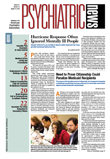Is “disturbed sleep a cause of serious mental illness, or simply an antecedent to it?”
“My answer is yes!” said ruth Benca, M.D., Ph.D., a professor of psychiatry at the University of Wisconsin School of Medicine.
Despite her jest, Benca and others weighed evidence supporting links between troubled sleep and troubled minds at the annual meeting of the Associated Professional Sleep Societies in Salt Lake City, Utah, in June.
Since diagnostic criteria for primary insomnia and major depressive disorder overlap, it often is hard to tell in clinical settings where a sleep disorder ends and depression begins, said Benca, a past president of the Sleep research Society. Nonetheless, people with major depression generally report more severe depression and more highly disturbed sleep than do people with primary insomnia.
Sleep disturbance is the most common refractory symptom in treated major depressive disorder, she said. Fatigue ranks second. Sleep disturbance also is the first symptom to appear in recurrence. These findings, Benca said, suggest sleep disruption is a core symptom in mood disorders.
More than 50 published epidemiological studies of insomnia using data collected from representative community-dwelling samples or populations consistently show an association between insomnia and major depressive episodes, noted Maurice Ohayon, M.D., D.Sc., Ph.D., director of the Sleep Epidemiology Research Center at Stanford University School of Medicine.
Longitudinal studies show that people who report insomnia at a first evaluation are more likely than people without insomnia to have depression at their next evaluation, Ohayon said. People with insomnia at two separate evaluations have a higher risk of depression than those without persistent trouble sleeping.
In a cross-sectional and retrospective study of a community-based sample of 722 adults aged 20 to 89, Daniel Taylor, Ph.D., an assistant professor of psychology at the University of North Texas in Denton, and colleagues found that people with insomnia were 9.82 times and 17.35 times more likely to have clinically significant depression and anxiety, respectively, than people without insomnia. The researchers excluded people with other sleep or medical disorders from their study.
About 20 percent of people with insomnia had clinically significant depression, and 19.3 percent had clinically significant anxiety, the researchers reported in the November 2005 Sleep.
The relationship between insomnia and depression and anxiety likely is reciprocal in some cases, Taylor said. A diathesis-stress model may trigger these associations, he suggested. People who develop insomnia at times of stress may find that lying in bed awake in the dark intensifies feelings of failure or worries about the future.
“If we can rapidly address their insomnia,” Taylor said,“ maybe we can bring them down to a subthreshold state.”
Research now under way aims to see whether cognitive-behavioral therapy for insomnia lowers the risk of depression, said Daniel Kripke, M.D., a professor of psychiatry emeritus at the University of California at San Diego. Some hypnotic medications may boost the risk of depression as compared with placebo, he said. He examined manufacturers' prescribing information for four recently approved hypnotics, finding depression reported as an adverse event in 109 of 5,535 subjects who took the medication, and in 21 of 2,318 who took the placebo, a roughly twofold increased risk (unpublished data).
While even clinicians sometimes quip, “Insomnia doesn't kill,” insomnia is far from trivial, said Douglas Moul, M.D., M.P.H., an assistant professor of psychiatry at the University of Pittsburgh School of Medicine. He cited a man who developed trouble sleeping and depression after his brother died. Six months later, the man committed suicide. While in treatment for his depression, the man frequently told his physician, “All I need is for my sleep to be right.”
One can imagine an underlying genetic risk in this individual, modified by exposure to life events, with pathology building up over time, Moul said, and worsened by the brother's death.
Studies of circadian rhythms support a causal role for insomnia in depression, said Fred Turek, Ph.D., a professor of neurobiology and physiology and director of the Center for Circadian Biology and Medicine at Northwestern University.
Some people with depression experience early morning awakening, he noted. This phenomenon is hypothesized to represent an advance of the body's sleep/wake cycle and cortisol rhythms, he said, and suggests that disordered circadian time-keeping may contribute to depression.
A genetic animal model for depression, the Wistar-Kyoto rat, exhibits sleep fragmentation and sleep-wake cycle disturbances similar to those in people with depression, he said.
“No one would say insomnia causes all major depression,” he said, “but it may have that effect in some people. We have to think about whether temporal disorganization in the brain is playing a contributory role in these individuals and figure out how to identify them and treat them.”
Most psychiatrists have been trained to treat a primary disorder, with the expectation that accompanying insomnia will improve, too, said Benca, who reviewed the diagnosis and treatment of persistent insomnia in the March 2005 Psychiatric Services.
Recent findings, she said, “imply that we should treat insomnia from the get-go—that along with depressive symptoms, insomnia should be a primary target of treatment.”
Treatment of insomnia today is akin to that of pain in years past, she said, asserting, “Sleep problems deserve the same attention as other pathology.” ▪
